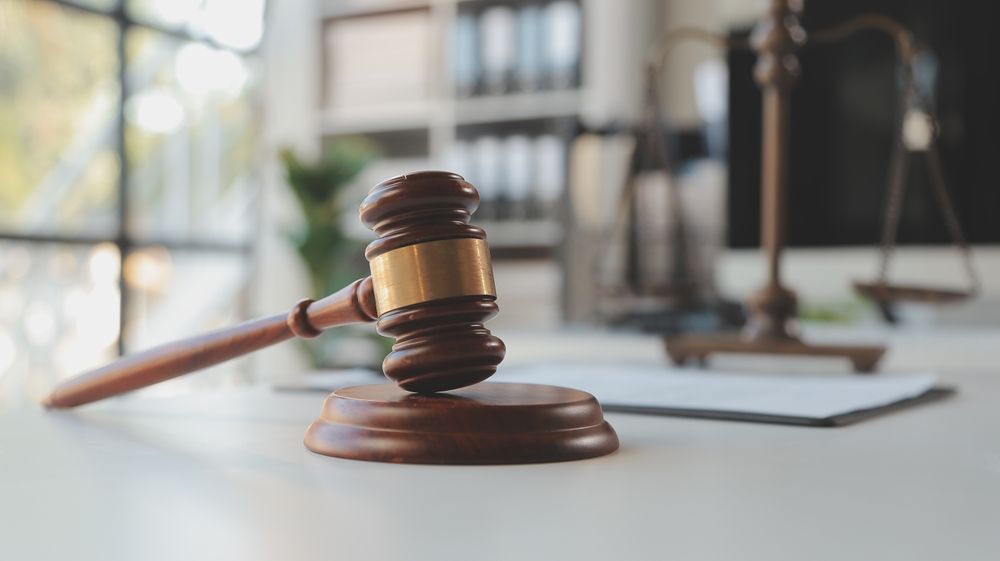Navigating the Atlanta Truck Accident Court Process: A Step-by-Step Guide
As a professional trucker, you take pride in driving responsibly, with safety as your highest priority. But sometimes things happen that are outside our control. Trucking accidents can devastate your reputation and put your job at risk. Knowing how trucking accident claims are handled in Georgia gives you insight into the process and an upfront advantage.
Navigating a truck accident case in Atlanta can be daunting, especially with the complexities involved. Many people face confusion about the court process, from filing a lawsuit to understanding trial outcomes. This guide will break down the key steps: preparing your case, navigating the pre-trial process, and detailing what to expect during the trial. By engaging with this content, readers will gain the clarity needed to successfully evaluate their situations and pursue fair verdicts, ultimately addressing the stress that often accompanies legal battles after an accident, particularly when policy violations like driving under the influence are involved.
Understanding the Atlanta Truck Accident Court Process
The Atlanta truck accident court process involves key differences from typical vehicle accidents, particularly regarding jurisdiction and applicable laws in Georgia. Understanding the concepts of jury involvement, comparative negligence, and the statute of limitations for truck accident claims is essential for individuals seeking compensation for pain and property damage. This section will detail these critical elements and their implications for pursuing justice in truck accident cases.
Key Differences Between Truck Accidents and Other Vehicle Accidents
Atlanta truck accidents often have complexities that distinguish them from standard vehicle collisions. One key difference is the size disparity between commercial trucks and passenger vehicles, which can lead to severe injuries, such as neck injuries, and a greater potential for significant property damage. Additionally, Georgia truck accident cases may involve multiple parties, including the truck driver, trucking company, and insurers, making the legal process more intricate as each party may have different responsibilities and liabilities in court.
The court process for Atlanta truck accidents also differs in the way comparative negligence is applied. Unlike typical vehicle accidents, where two drivers may share blame, truck accidents often introduce the trucking company’s policies and practices into the equation. This complexity can influence the outcome of the case and the damages awarded for physical therapy and other medical care required. Understanding these differences is crucial for victims seeking full compensation in Georgia beyond merely assessing fault at the scene of the accident.
Jurisdiction and Applicable Laws in Georgia
In Georgia, the jurisdiction for truck accident cases typically resides in either state or federal court, depending on the specifics of the case, such as the trucking company's operations and statutory regulations. Victims should be aware that liability insurance requirements for commercial trucks often differ significantly from those for personal vehicles. This distinction can complicate the claim process, especially when seeking a settlement that fully addresses medical expenses, lost wages, or even a wrongful death claim resulting from a truck accident.
Applying Georgia’s laws effectively requires understanding the nuances of the legal system, particularly in relation to traffic light violations that may lead to accidents. For individuals navigating this complex landscape, obtaining legal advice from experienced attorneys can prove invaluable. They can assist in gathering evidence, establishing liability, and negotiating with insurers, ensuring that victims receive fair compensation for their injuries and losses.
Statute of Limitations for Truck Accident Claims
In Georgia, the statute of limitations for truck accident claims is typically two years from the date of the accident. This means that victims have a limited timeframe to file a personal injury lawsuit, which includes gathering evidence and potentially preparing for a deposition. Failure to initiate legal action within this period may result in losing the right to seek compensation for damages incurred, such as medical expenses and lost wages due to injuries sustained in an accident, particularly on busy routes like Interstate 285.
Understanding the statute of limitations is crucial for truck accident victims, as it affects the strategy for pursuing claims. Timely legal action allows victims to collect necessary documentation and witness statements related to the accident, including details about mechanical failures like brake issues that could have contributed to the incident. Consulting with experienced attorneys can provide valuable insights into the legal process, ensuring that victims effectively navigate the complexities of their case and meet all relevant deadlines.
Preparing Your Truck Accident Case for Court
Gathering evidence and documentation is critical in building a strong case for truck accident claims. Victims should also consult with an Atlanta truck accident attorney to navigate the legal complexities effectively. Additionally, assessing damages and compensation potential is essential, particularly when addressing the anguish caused by issues like distracted driving. Understanding these elements ensures victims are well-prepared for court.
Gathering Evidence and Documentation
Gathering evidence and documentation is crucial for individuals involved in commercial truck accidents. Victims must compile a range of materials, including medical records that detail any chronic pain or injuries like amputation sustained in the accident. These documents provide essential insights into the severity of injuries and support claims for compensation, demonstrating how the accident has impacted the victim’s life.
In addition to medical records, securing witness statements and any available police reports is important. Statements from passengers or bystanders can corroborate details about the accident, while a court reporter can assist in documenting testimonies for future proceedings. Collecting this evidence early helps establish a solid case and can significantly influence the outcome of legal actions in the Atlanta court system.
Consulting With an Atlanta Truck Accident Attorney
Consulting with an Atlanta truck accident attorney is essential for victims looking to navigate the complexities of the legal system. An experienced lawyer can provide invaluable guidance on how to approach a truck accident settlement, ensuring that victims understand their rights and options. This expertise is particularly important when dealing with specific issues, such as injuries from a burn caused by a truck accident or the challenges associated with incidents involving a box truck.
Moreover, understanding the statute of limitations is critical for those pursuing claims after a truck accident. An attorney can help victims gather the necessary evidence swiftly and represent their interests during negotiations with insurers. This support is crucial in maximizing compensation for damages, including medical costs and lost wages, while also alleviating the stress that often accompanies legal proceedings.
Assessing Damages and Compensation Potential
Assessing damages and compensation potential in a truck accident case is vital for victims in metro Atlanta seeking restitution for their injuries. This process involves calculating both economic damages, such as medical expenses and lost wages, and non-economic damages that account for pain and suffering. Victims should work closely with an advocate to establish the total impact of their injuries, including how they affect their daily lives and ability to work, particularly if the accident occurred on a busy lane.
The percentage of liability attributable to each party involved in a truck accident can significantly influence the amount of compensation a victim receives. For instance, if the victim is found to bear some responsibility, that percentage may reduce the total compensation awarded. Understanding this aspect of the court process, while employing a professional advocate, can ensure that victims are well-prepared to present their case effectively and secure the compensation they deserve for their injuries.
Filing a Truck Accident Lawsuit in Atlanta
Filing a truck accident lawsuit in Atlanta involves several critical steps that victims must navigate to pursue justice effectively. This includes drafting and submitting a well-structured complaint, serving the defendant—typically a truck driver or their employer—properly, and responding to any counterclaims or legal motions that may arise. Each of these actions plays a vital role in ensuring that the case is heard and that testimony regarding the accident is clearly presented in court.
Victims must understand the legal framework surrounding these procedures, as they directly impact the outcome of their claims, including those related to potential disability resulting from accidents. This guide will elaborate on each step necessary for filing a lawsuit, providing practical insights to help individuals prepare for the legal process ahead.
Drafting and Submitting the Complaint
Drafting and submitting the complaint is a pivotal step in filing a truck accident lawsuit in Atlanta. This legal document outlines the victim's suffering, detailing injuries such as spinal cord injury and any surgeries required as a result of the accident. It is crucial to incorporate the specifics of the accident, including instances of drunk driving, to illustrate the circumstances surrounding the claim and justify potential punitive damages against liable parties.
The complaint must present essential information clearly, including the parties involved, the nature of the injuries sustained, and the compensation sought. A well-structured complaint not only enhances the chances of a favorable outcome but also allows the court to understand the extent of the victim's injuries and how they impact daily life. Victims should ensure that all relevant details are included to support their case and to illustrate the gravity of their situation:
Serving the Defendant Properly
Serving the defendant properly is a crucial step in the truck accident lawsuit process in Atlanta. It ensures that the individual or entity being sued, typically the truck driver or their employer, is officially notified of the legal action and given the opportunity to respond. This process carries significant weight, as improper service can lead to delays and complications, potentially adding stress to an already challenging situation for victims seeking compensation for pain and suffering resulting from their injuries.
Victims should engage experienced legal counsel to navigate the nuances of serving the defendant, as they have a duty of care to ensure all legal requirements are met. Proper documentation and adherence to the state's regulations about service of process are essential to uphold the integrity of the case. This diligence helps strengthen the victim’s position, allowing witnesses and evidence to be effectively introduced in court, ultimately supporting their claim for damages sustained in the truck accident.
Responding to Counterclaims and Legal Motions
Responding to counterclaims and legal motions is a critical part of the truck accident lawsuit process in Atlanta. When a claims adjuster files a counterclaim, the plaintiff must address each point raised to ensure that their original claim remains intact. This requires a thorough understanding of the claim's nuances, especially in challenging cases involving serious injuries such as paralysis, where the stakes are high and the details matter significantly in the courtroom.
Effective responses to counterclaims involve presenting clear evidence and arguments. The plaintiff should prepare to refute claims of failure that may be levied by the defense, as these can impact the outcome of the lawsuit. Engaging an experienced attorney can provide valuable insights into how to structure responses effectively, allowing victims to confidently navigate the courtroom process and work toward securing the compensation they deserve.
Navigating the Pre-Trial Process
Understanding the pre-trial process in Atlanta truck accident cases is essential for victims seeking justice. This phase includes the discovery process, where each party exchanges important information, including details about insurance policies and vehicle specifics. Victims will also encounter depositions and interrogatories that clarify facts surrounding injuries like spinal cord damage. Furthermore, discussing mediation and potential settlements can significantly impact the outcome before a trial commences.
Discovery Phase: Exchanging Information
The discovery phase in the Atlanta truck accident court process is crucial for gathering detailed information that supports each party's claims. During this time, both sides exchange documents relevant to the case, such as accident reports, medical records detailing any medication received, and evidence related to the intersection where the accident happened. Understanding the information shared can significantly impact any negotiations aimed at reaching a settlement before the trial.
Effective discovery can set the stage for a successful case by revealing critical facts about the accident. For example, discovering previous violations by a truck driver can strengthen a victim’s case, promoting a more favorable negotiation outcome. This phase also involves depositions, where witnesses are questioned under oath, ensuring that the specifics of the accident are clearly established before heading to trial:
Depositions and Interrogatories Explained
Depositions and interrogatories are vital components of the pre-trial process in a truck accident claim. During a deposition, witnesses, including the truck driver and others involved, provide sworn testimonies about the accident circumstances, which can shed light on negligence issues and influence the jury trial's outcome. Additionally, interrogatories are written questions submitted to the opposing party, allowing attorneys to gather crucial information that may help establish a strong case, manage risks, and ensure that all relevant facts, such as accident details and therapy needs, are appropriately addressed.
These steps help set the tone for negotiations or trial proceedings. For instance, if a deposition reveals inconsistencies in the statements of the truck driver, it may strengthen the victim's position and lead to a more favorable settlement. The insights gained from these processes not only clarify the facts surrounding the truck accident but also guide legal strategies, ensuring victims are well-prepared for the ensuing challenges.
Participating in Mediation and Settlement Discussions
Participating in mediation and settlement discussions is a vital aspect of the pre-trial process in truck accident cases. These discussions offer victims an opportunity to negotiate directly with insurance companies and the involved parties, including the trucking company. Skilled attorneys can significantly enhance this process by helping victims communicate their needs effectively, ensuring that property damage, medical expenses, and other relevant factors are accurately presented.
Mediation allows both parties to explore potential resolutions without the added stress of a trial. This approach is especially beneficial in cases involving commercial vehicles, where complexities like premises liability can come into play. By working closely with experienced attorneys during mediation, victims can better understand their options and strive for a settlement that addresses their pain and suffering while mitigating the risk of a protracted legal battle.
Understanding the Trial Process in Atlanta
The trial process in Atlanta for truck accident cases involves several critical stages that determine the outcome of claims for catastrophic injuries and legal liability. This section will explore selecting a jury and making opening statements, presenting evidence and witness testimony, and concluding with closing arguments followed by jury deliberation. Understanding these elements is essential for navigating the complexities that arise in truck accident litigation, including issues related to driver fatigue and accidents such as jackknifing.
Selecting a Jury and Opening Statements
During the trial process in Atlanta truck accident cases, selecting a jury is a crucial step that can significantly impact the outcome of accident claims. The jury selection process, known as voir dire, allows attorneys to assess potential jurors’ backgrounds and biases related to fault in truck accidents. An attorney well-versed in this aspect will seek jurors who can objectively consider the evidence, particularly the nuances of the statute governing liability in commercial truck incidents, helping to ensure a fair trial for their clients.
Following jury selection, opening statements are presented by both parties, setting the stage for the trial. In these statements, attorneys outline their arguments and establish the narrative of the case, including the specifics of the truck accident and the damages sought. A strong opening statement not only clarifies the case but also engages the jury's attention, emphasizing key facts that will be supported by evidence during the proceedings. This pivotal moment is vital as it shapes the jury's initial perceptions, paving the way for a successful resolution of the accident claims involved.
Presenting Evidence and Witness Testimony
Presenting evidence and witness testimony is a crucial part of a truck accident lawsuit in Atlanta. To establish the facts of the case, a well-organized presentation of medical records, accident reports, and other relevant documents is necessary. This process often requires the testimony of witnesses who can clearly explain what happened during the accident, providing essential details that support the claims of negligence, safety violations, or other responsible behaviors contributing to the incident.
The judge plays a significant role in overseeing the presentation of this evidence. They ensure that all legal protocols are followed, which may include objections from attorneys regarding the admissibility of certain pieces of evidence, such as medical malpractice records. Efficiently navigating this aspect of the trial process helps create a compelling narrative that can influence the jury’s decision, making it imperative for victims to work closely with their legal representation to prepare thoroughly and effectively.
Closing Arguments and Jury Deliberation
During the closing arguments in an Atlanta truck accident lawsuit, attorneys summarize the evidence presented throughout the trial. This includes crucial elements like witness statements, expert testimony, and adherence to guidelines set by the Federal Motor Carrier Safety Administration. A compelling closing argument can reinforce the impact of the presented evidence, aiming to sway the jury's opinion regarding liability and the extent of damages for the injuries sustained.
Following the closing arguments, the jury deliberates to reach a verdict based on the evidence presented. This process involves discussing traffic circumstances, credibility of witness statements, and the overall case dynamics. Jurors must weigh the information carefully, considering not just the facts but also the implications of their decision on the lives of those involved in the accident:
Post-Trial Steps and Receiving Compensation
After the trial concludes, victims of trucking accidents face essential steps for collecting compensation and understanding their legal rights. This section will cover the judgment and award collection process, guiding individuals on how to retrieve damages awarded. It will also discuss the possibility of filing an appeal, if necessary, and managing settlements, providing practical insights for future considerations related to their injuries and medical care with a physician.
The Judgment and Award Collection Process
The judgment and award collection process for truck accident cases in Atlanta begins immediately after the court issues a decision favoring the victim. Victims should understand that receiving compensation involves more than just the verdict; it includes mechanisms for ensuring that the awarded amounts are actually collected from the responsible parties. This may require efforts such as negotiating payment plans or even pursuing garnishments if necessary, depending on the financial capability of the liable parties.
Filing an Appeal if Necessary
If the verdict in a truck accident case does not favor the victim, they may consider filing an appeal. An appeal is a request for a higher court to review the case, focusing on potential legal errors made during the trial that could have affected the outcome. This process requires a thorough understanding of the grounds for appeal and adherence to specific procedural rules, making it essential for victims to consult with experienced legal counsel to navigate this complex terrain effectively.
In many instances, appeals can draw out the legal process, potentially delaying the receipt of compensation. Victims should be prepared for this possibility, as the appellate court will reevaluate evidence rather than conducting a new trial. By gathering necessary documentation and consulting with a reliable attorney, victims can work toward ensuring their rights are upheld and that they explore every opportunity for justice, thereby increasing their chances of favorable outcomes in the appeal process.
Managing Settlements and Future Considerations
Managing settlements after a truck accident lawsuit in Atlanta requires careful consideration of several factors. Victims must work with their attorneys to assess the full impact of their injuries, including medical expenses and ongoing treatment needs. This approach ensures that any settlement offers received are comprehensive and adequately address all damages incurred, allowing victims to focus on recovery without the burden of financial uncertainty.
Future considerations also play a crucial role in negotiations. It is essential for victims to account for potential long-term effects of their injuries, such as the possibility of reduced earning capacity or the need for ongoing medical care. By engaging with skilled legal professionals, victims can navigate these complexities to secure settlements that not only cover immediate costs but also provide financial security for future needs, paving the way for a more stable recovery process.

Attorney Jessica Nix, Managing Partner
Jessica Nix is Managing Partner and a Personal Injury Attorney at the Law Office of Rickard, Drew & Nix in Atlanta, with more than 10 years of experience representing injury victims in courts across Metro Atlanta. She graduated cum laude from the University of Georgia School of Law, where she served as an editor of the Journal of Intellectual Property Law. Jessica is admitted to the State Bar of Georgia, is a member of the Georgia Trial Lawyers Association, and was named a Georgia Super Lawyers Rising Star for Personal Injury from 2017 to 2019. To speak with the Law Office of Rickard, Drew & Nix, schedule a free consultation today.



